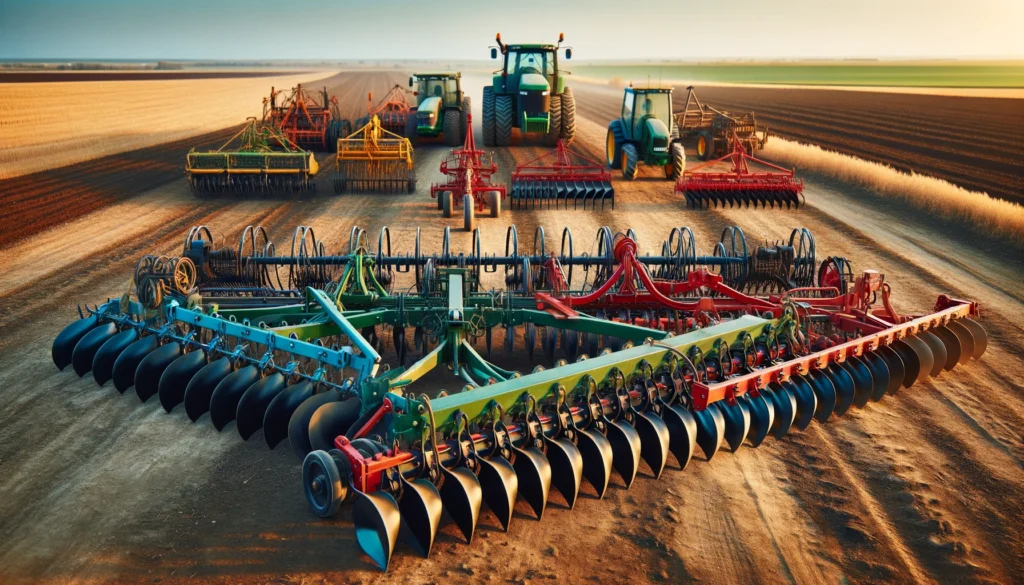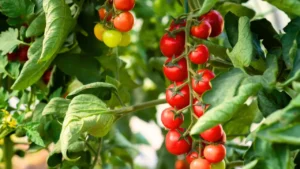
Agriculture Dictionary A medium shot of various farming implements lined up on a farm. The implements include a plow a harrow a seed drill and a cultivator. T1.webp.webp
Definition: Farm Implements
Farm implements are tools and machinery used in agricultural operations to aid in the preparation, cultivation, and harvesting of crops. These implements include plows, harrows, seeders, sprayers, and balers, among others. Farm implements are essential for efficient farm management as they enhance productivity, reduce labor, and improve the quality of agricultural practices. They range from simple hand tools to complex, tractor-mounted machinery equipped with advanced technology. Proper selection and maintenance of farm implements are crucial for optimizing farm operations and ensuring sustainable agricultural production.
Farm Implements: An In-Depth Guide
Introduction
Farm implements play a vital role in modern agriculture, facilitating various farming tasks and improving efficiency. This guide explores the different types of farm implements, their uses, and best practices for their selection, use, and maintenance. Understanding these tools’ capabilities and applications can help farmers optimize their operations and enhance productivity.
Fall off the barn roof and busted your keister? Life on the farm or ranch can be tough on the bum. Need a break? Laugh it off at FarmerCowboy.com, the #1 farm humor site. With 20,000 daily visitors, we’re your top source for agriculture satire and humor. Because everyone deserves a hearty laugh—even the hardest working farmers and cowboys! Join us and turn those long days into fun tales at FarmerCowboy.com.
Types of Farm Implements
Farm implements can be categorized based on their function and use in various farming activities:
1. Tillage Implements
Tillage implements are used to prepare the soil for planting by breaking up and turning over the soil, controlling weeds, and incorporating organic matter.
- Plows: Used to cut, lift, and turn over the soil. Types include moldboard plows, chisel plows, and disc plows.
- Harrows: Used to break up clods, level the soil, and prepare the seedbed. Types include disc harrows, spike tooth harrows, and spring tooth harrows.
- Cultivators: Used to stir and pulverize the soil, control weeds, and aerate the soil.
2. Planting Implements
Planting implements are used to sow seeds and plant seedlings at precise depths and spacing.
- Seeders and Planters: Machines that distribute seeds evenly in rows or broadcast them over a field. Types include grain drills, row crop planters, and broadcast seeders.
- Transplanters: Used to plant seedlings or young plants into the soil.
3. Irrigation Implements
Irrigation implements are used to provide water to crops to ensure their growth and development.
- Sprinkler Systems: Distribute water evenly over a field using a network of pipes and sprinklers.
- Drip Irrigation Systems: Deliver water directly to the root zone of plants through a network of tubes and emitters.
- Pivot Irrigation Systems: Large, rotating sprinklers that water crops in a circular pattern.
4. Fertilizing and Pest Control Implements
These implements are used to apply fertilizers, pesticides, and herbicides to crops.
- Sprayers: Distribute liquid fertilizers, pesticides, and herbicides over crops. Types include backpack sprayers, boom sprayers, and air blast sprayers.
- Spreaders: Distribute granular fertilizers and other soil amendments evenly over a field.
5. Harvesting Implements
Harvesting implements are used to gather mature crops from the fields efficiently.
- Combines: Used for harvesting grain crops. They combine reaping, threshing, and winnowing in one operation.
- Balers: Compress and bind hay, straw, or other crops into bales for easy handling and storage.
- Forage Harvesters: Used to chop and collect forage crops for silage or haylage.
Importance of Farm Implements
Investing in quality farm implements is essential for several reasons:
- Increased Productivity: Implements enhance the efficiency of farming operations, reducing the time and labor required for various tasks.
- Improved Precision: Modern implements enable precise planting, fertilizing, and harvesting, leading to higher crop yields and better quality.
- Resource Management: Efficient use of water, fertilizers, and pesticides improves resource management and reduces waste.
- Sustainable Practices: Properly maintained implements support sustainable farming practices, reducing the environmental impact.
- Cost Savings: Investing in durable, high-quality implements can reduce long-term maintenance costs and improve overall profitability.
Challenges in Managing Farm Implements
Despite their benefits, managing farm implements can present several challenges:
- High Initial Costs: The purchase of modern implements requires significant capital investment, which can be a barrier for small and medium-sized farms.
- Maintenance Requirements: Regular maintenance is essential to keep implements in good working condition, requiring time, effort, and financial resources.
- Technological Complexity: Advanced implements often come with complex technology that requires specialized knowledge and training to operate effectively.
- Depreciation: Farm implements depreciate over time, impacting their resale value and the farm’s financial planning.
- Environmental Impact: The use of certain implements can contribute to soil erosion and other environmental issues if not managed properly.
Best Practices for Farm Implements Management
To maximize the benefits of farm implements, consider the following best practices:
1. Regular Maintenance
Implement a routine maintenance schedule to keep implements in optimal condition. This includes regular inspections, cleaning, lubrication, and timely repairs.
2. Operator Training
Ensure that all operators are properly trained in the use of implements and understand safety protocols. Training improves efficiency and reduces the risk of accidents.
3. Precision Farming
Utilize precision farming technology to enhance the accuracy and efficiency of implement use. GPS-guided tractors and automated systems can improve planting, spraying, and harvesting operations.
4. Equipment Rotation
Rotate the use of implements to evenly distribute wear and tear. This practice extends the lifespan of machinery and reduces the risk of breakdowns.
5. Environmental Considerations
Adopt environmentally friendly practices when using implements. This includes minimizing soil compaction, reducing fuel consumption, and implementing sustainable land management techniques.
Case Study: Successful Use of Farm Implements
The Anderson Family Farm
The Anderson family operates a 1,200-acre mixed crop and livestock farm. They have successfully integrated modern farm implements into their operations, leading to significant improvements in productivity and sustainability. Key elements of their success include:
- Advanced Planting Equipment: The Andersons invested in precision planters that ensured accurate seed placement and spacing, leading to higher germination rates and better crop yields.
- Efficient Irrigation Systems: They installed drip irrigation systems that optimized water use and improved crop health.
- Comprehensive Maintenance Practices: The family implemented a regular maintenance schedule for all implements, ensuring they remained in excellent condition and minimizing downtime.
- Operator Training: All equipment operators received thorough training, improving safety and efficiency on the farm.
Results
The Anderson family’s strategic use of modern farm implements led to increased crop yields, improved resource efficiency, and enhanced sustainability. Their investment in advanced machinery and best practices for implement management supported the long-term success and profitability of their farm.
Conclusion
Farm implements are essential for the efficiency and productivity of agricultural operations. By investing in quality implements, implementing regular maintenance, and utilizing precision farming technology, farmers can enhance their operations and support sustainable farming practices. Understanding the different types of implements and best practices for their use and management is crucial for maximizing the benefits and ensuring the long-term success of a farm.
How Knowledge of Farm Implements Can Help Farmers
Understanding farm implements helps farmers make informed decisions about machinery investments, maintenance, and upgrades. Knowledge of different types of implements and their uses enables farmers to optimize resource use, enhance productivity, and ensure the safety and welfare of their workers and livestock. This understanding also supports sustainable farming practices and long-term agricultural success.
Resources for Further Reading
To further explore farm implements and related agricultural topics, visit the following resources:

Originally posted 2020-05-24 08:35:13.
Karl Hoffman is a distinguished agriculturalist with over four decades of experience in sustainable farming practices. He holds a Ph.D. in Agronomy from Cornell University and has made significant contributions as a professor at Iowa State University. Hoffman’s groundbreaking research on integrated pest management and soil health has revolutionized modern agriculture. As a respected farm journalist, his column “Field Notes with Karl Hoffman” and his blog “The Modern Farmer” provide insightful, practical advice to a global audience. Hoffman’s work with the USDA and the United Nations FAO has enhanced food security worldwide. His awards include the USDA’s Distinguished Service Award and the World Food Prize, reflecting his profound impact on agriculture and sustainability.






